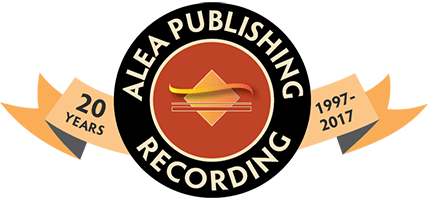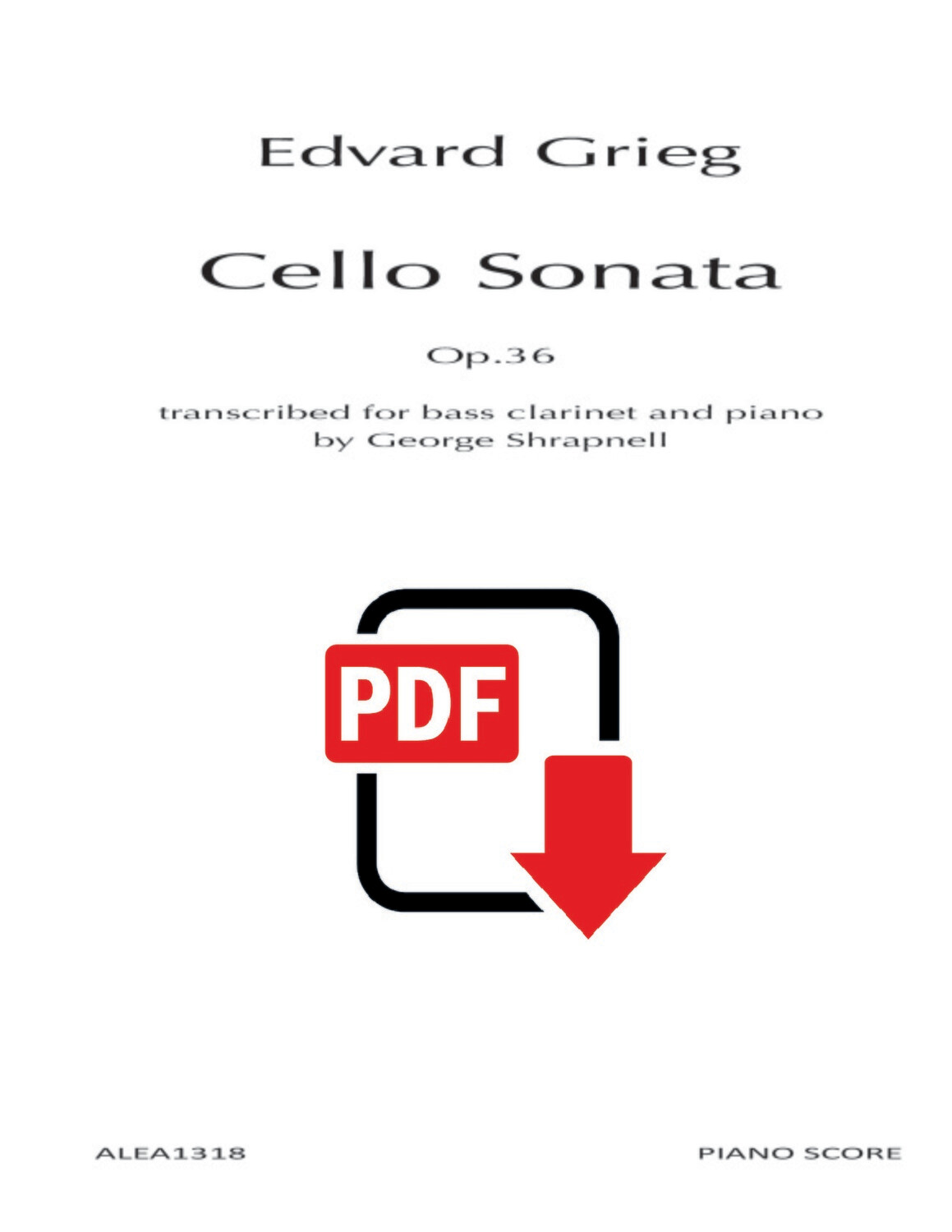

Welcome!
This site is home to Alea Publishing & Recording, specializing in music for the bass clarinet.
We offer a growing catalog of creative, artistic transcriptions and new works for bass clarinet solo & ensemble.
Grieg: Sonata Op.36 (PDF)
About the Music
We thank the arranger for sharing this note about the piece and his arrangement:
The Norwegian composer, conductor, and pianist Edvard Grieg (1843-1907) composed the Cello Sonata in A minor, Op.36 between 1882-83. This was just after a period in Grieg’s life where composition had not been at the forefront of his career, but rather, his conducting duties with the Bergen Symphony Orchestra, and an unfortunate period of illness.
The work, which contains three movements: the Allegro agitato, Andante motto tranquil, and the Allegro motto e marcato, was premiered by Cellist Friedrich Ludwig Grützmacher, with the composer at the piano, in Dresden, October 1883.
Op. 36 contains some borrowed themes from the composer’s own works. Notably, a theme from the Funeral March in memory of Richard Nordraak, and the wedding march from Grieg’s Three orchestral pieces from Sigurd Jorsalfar. There is also a very distinctive similarity and possible borrowing again, this time from Grieg’s arguably most well recognised piece, the 1868 Piano Concerto in A minor. The theme being the infamous opening statement in the piano concerto, which in the cello sonata is mimicked somewhat across both the cello and the accompaniment.
The cello and bass clarinet are both incredibly sonorous and diverse instruments in both their range, and abilities to evoke a plethora of tone colours. After some careful score checking, I realised that there were only a few places (amounting to only a handful of bars in the whole work) that would need adapting to suitability, and practically fit the bass clarinet - for these, there are “optional 8vb” markings. The work really does utilise the entire ‘standard’ range of the low C bass clarinet (nearly 4 octaves). It is certainly a piece for the virtuoso player of the instrument.
There are, of course, always challenges when adapting, arranging, and playing music on an instrument that is different to the one originally intended by the composer. One of the significant differences between the cello and bass clarinet, is the cello’s advantageous ability to be a ‘chordal’ instrument, with the use of double and triple stops, whereas the bass clarinet is a single note instrument (excluding contemporary techniques such as multi phonics). This did mean that some careful arranging decisions had to be made to ensure that the harmony and authenticity of Grieg’s Cello writing was kept as faithful as possible. To overcome this hurdle, I instead decided to use the upper note of the chord as the main focal point, and to treat the other notes as grace notes, meaning they are still very much part of the music. You will also notice that in a few places throughout each movement, the bass clarinet part contains some optional octave lower markings, this is to make the part more accessible and practical for performance, and although the original octaves are possible by use of altissimo fingerings, I felt that it would be more useful to have these passages at a more practical range for the bass clarinet, (should you wish to play these sections at the original pitch, these are included on the part).
I hope that this arrangement cements itself into the bass clarinet repertoire as a serious concert worthy work just like the original cello edition. Tempo markings are only advisory, thus allowing this work and its movements to be paced accordingly with the performers’ ideal tempos.
Piano score: 67 pages. Bass clarinet part: 25 pages. Edited by Skyler Hedblom.
Listen to the work in its original instrumentation:
PDF Edition
Purchasing this item will give you access to download the music as a PDF. If you would prefer to purchase a hard copy, please click here.
About the Arranger
Born in Winchester, England, George Shrapnell studied his undergraduate degree at Goldsmiths College, University of London where he graduated with First Class Honours. He specialised in performance, composition, jazz arranging, and orchestration under Paul Bartholomew, and Mick Foster. As a saxophonist, he is now studying for his MMus and MPerf under John Harle, Mick Foster, Alastair Penman, Nick Moss, and Scott Stroman, at the Guildhall School of Music and Drama where he was recently awarded the concert recital diploma for excellence in his final recital. Active in the fields of jazz, theatre, classical, and contemporary music - George enjoys and takes pride in being as versatile as possible as a musician in the 21st Century, facilitated by a portfolio career consisting of performing, composing, arranging, and teaching.
Based in New Cross in SE London, he is a freelance Saxophone and woodwinds player, and plays all the saxophones, clarinets, and flutes. This has lead to work in big bands, contemporary music, orchestras, and musical theatre, all of which he regularly plays for as part of his freelance work in and around London. He is also a session musician, recording woodwinds for engagements such as adverts, function bands, EP's (his own and colleagues'), and demos for original compositions. George has felt very privileged to have worked/performed with the likes of Cat Stevens, Pete Long, Tim Garland, Mark Anthony Turnage, Marin Alsop, and Labi Siffre. All of whom have made a positive impact on shaping his development as a musician.
As a composer and arranger, George writes from the heart and does not just write music for the sake of it. Melody, rhythm, and harmony all take a high priority when composing, he is particularly influenced by jazz, folk, minimalism, as well as sacred and secular choral music, and each of these influences can be found in much his work. He writes for a wide plethora of instrumentations and ensembles, and has a passion for expanding the repertoire of combinations of instruments that are seldom written for. He also writes for saxophone quartet, flute choir, clarinet quartet, works for multiple keyboards, percussion ensemble, big band, choral music, and smaller duo ensembles. Enjoying a diverse spectrum of music, George does not confine himself to one style of music either when performing or composing. He also arranges for varying ensembles and clients however and whatever is required in the brief.
Also a passionate teacher, George has held a number of peripatetic teaching posts and private pupils across South East London, covering all manner of music making and learning, such as beginner clarinet, flute, saxophone, and piano, initial music theory, and early years musicianship.
About Us

Kim Davenport
President
Duo Alea, the father-daughter duo of Michael and Kimberly Davenport, began performing music for bass clarinet and piano in 1996. As performers searching for new repertoire and teachers working with students eager to develop as performers, it quickly became clear that there was a need for more repertoire featuring the bass clarinet. Filling this need became the mission of Alea Publishing & Recording.
Since our first publication in 1997, the Alea catalog has now grown to include over 300 titles. We pride ourselves on the accuracy and quality of our sheet music, as well as our ability to ship directly to customers around the world.
We are proud of the diversity of our catalog in terms of the inclusion of works by composers and arrangers from around the world. We are interested in continuing to expand this diversity, representing musical ideas from around the world.
Following Michael's passing in 2019, Kim has taken over solo management of Alea Publishing. In 2020, Alea established the Dolphy Prize, an annual composition award for new works for bass clarinet by black composers.
Would you like to be informed about additions to our catalog and other news? Join our e-mail list!
